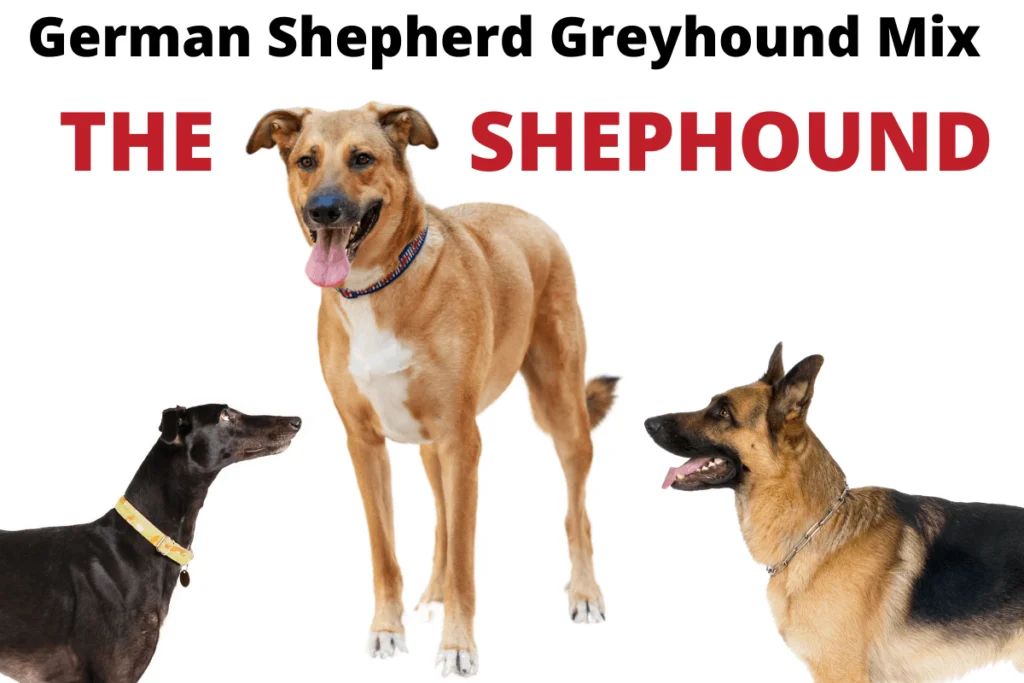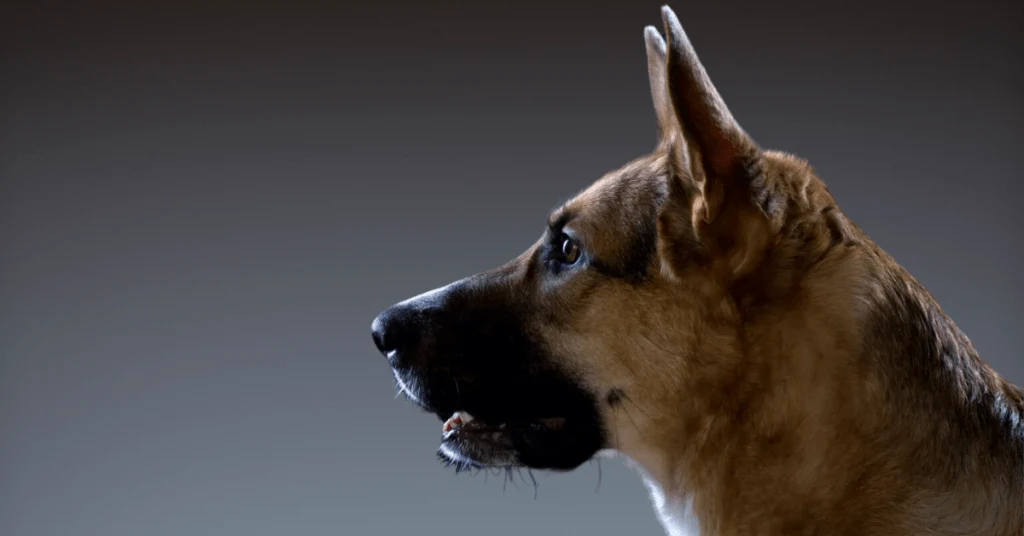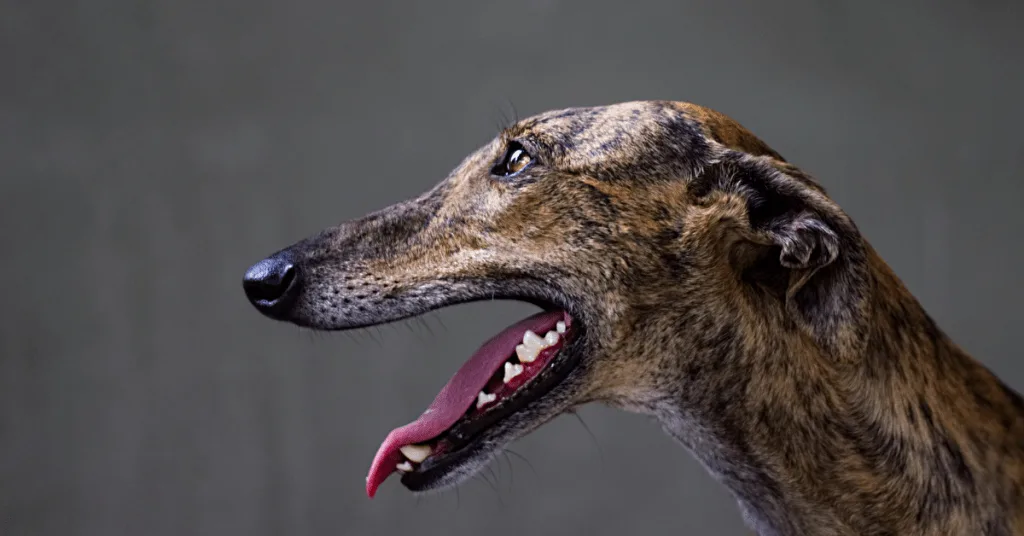
Sometimes genetics come together in unusual and amazing ways, as in the case of the German Shepherd Greyhound mix. If you want to know more about what to expect from this amazing breed, you’re in the right place!
The German Shepherd Greyhound mix, also known as a Shephound, is a tall, athletic, intelligent and loyal breed that is easy to train. However, since German Shepherds and Greyhounds are very different breeds, there is a lot of potential variety in terms of personality and looks when you mix the two.
In this article, you will learn all about the German shepherd Greyhound mix. If you are considering getting a Greyhound shepherd, read on.
Click Here to Jump to a Section
What Is a Greyhound Shepherd or Shephound?
A Greyhound shepherd is a mix between a German Shepherd and a Greyhound. Both German shepherds and Greyhounds are large dogs, and so is the Greyhound Shepherd.
Every German Shepherd Greyhound mix will be different. It is impossible to know which traits the mixed pup will inherit from its father and which traits it will get from its mother. However, most German Shepherd Greyhound mixes share some specific characteristics.
Both German Shepherds and Greyhounds are large dogs, so you can expect a Greyhound Shepherd to be a medium to a large dog as well.
You can also expect this mix to have a coat of hair that is somewhat in between the short hair of a Greyhound and the thicker, coarser hair of a German Shepherd.
Both German Shepherds and Greyhounds are athletic dogs. The Greyhound, in particular, is very muscular and can run very fast. As such, you can expect a mixed dog to be athletic as well and probably stronger and more muscular than a regular German shepherd.
Like the German Shepherd, the Greyhound is very loving, affectionate, and loyal. And as such, whether a mixed pup takes after its mother or father, you can expect it to be gentle, fun-loving, loyal, and affectionate, both with you and your kids.
As for its exact appearance, expect a lot of variety depending on how much it takes after its mother or father. Regardless, this particular mix is always cute and adorable.
Is the German Shepherd Greyhound Mix the Right Breed for Me?
Before you get any dog, it is important to know what the breed is like.
Are they small or large? Gentle or aggressive? Fun-loving or introverted? Athletic or restful? Will it bark, or is it almost always quiet? It is important to know what you are looking for as well and what you can handle.
Here are some factors to consider before getting a German Shepherd Greyhound mix:
Do You Have Enough Space?
As mentioned, the Greyhound Shepherd is a large dog. You will need enough space to keep it satisfied.
If you have very little extra room in your apartment, you might want to consider getting a smaller dog. A male German Shepherd Greyhound mix can be up to 30 inches tall (though it is likely to be a couple of inches shorter if it has more German Shepherd traits).
Also, remember that both German Shepherds and Greyhounds love to run around. After all, German Shepherds were bred for shepherding purposes and have evolved to live in big, open spaces.
Greyhounds love open spaces as well. If you have a fenced in front or back yard where your dog can run around and enjoy itself, as well as enough room in the house, a Greyhound Shepherd is a good choice.
Do You Have Experience or Access to a Professional Dog Trainer?
Greyhounds are not known to be aggressive, and neither are German Shepherds. In fact, both are generally described as docile and gentle.
However, Greyhounds are extremely fast and very strong dogs, and many German Shepherd Greyhound mixes will be as well.
As such, it is important to know how to train your dog properly. If you are a first-time dog owner and are looking for a gentle dog, a Greyhound Shepherd should not be removed from the running automatically.
However, be aware that it will probably be strong, fast, and powerful, and if you have small kids around, it might be better to get a smaller dog.
Important Note
If you are planning on adopting an abandoned German Shepherd Greyhound mix, they may be traumatized and living in a state of fear. This is because many Greyhounds are adopted out of a former life of being abused as racing dogs.
The trauma that a dog suffers from this unethical practice can cause deeply ingrained and long lasting fear in a Greyhound. Because of this, it is very important that you be prepared to spend adequate time training this mix through positive reinforcement.
If you do not have the time or confidence to do this yourself, be sure that you are prepared to reach out to a professional dog trainer, as neglecting this step will lead to a lower quality of life for your dog, and may even bring about some very preventable aggression issues.
German Shepherd and Greyhound Basic Facts
Both German Shepherds and Greyhounds are known to be large but loving. Although they are not usually acquired to be guard dogs, they are fiercely loyal and will stand up for you until the end. Greyhounds, in particular, are lightning-fast and are sometimes bought for racing purposes.
Let’s take a closer look at both breeds to understand the German shepherd Greyhound mix!
German Shepherd Basic Facts

German Shepherds love the outdoors. They are one of the most easily recognizable dog breeds and are popular in households worldwide.
Rittmeister Max von Stephanitz was considered the “discoverer” of German Shepherds; he was a dog breeder who first recognized the German Shepherd’s qualities and its ability to be a great herder.
He went on to found a club for German Shepherds, with his own German Shepherd being an original club member.
Eventually, Max von Stephanitz realized that not only were German Shepherds great for herding, but they would also serve as great companions and helpers in the police and military.
For that reason, he encouraged their use in police work, which is why so many are used in policing today. In fact, when most people think of a “police dog,” they think of a German Shepherd.
If you would like to know more about German Shepherds as police dogs, make sure to read this excellent article: Why Are German Shepherds Good Police Dogs?
German shepherds are kind, loyal, affectionate, wise, and easy to train. They are also athletic and generally very healthy and able dogs. That’s why they are preferred by police departments all over the world.
That’s also the reason why they make such great pets. They are great with kids and forever loyal.
German Shepherds are usually black, tan, and/or brown, though they can come in many colors.
They are tall dogs, with the average male being between 24-26 inches (61-64 centimeters). German Shepherds have thick, coarse hair, so they will shed a lot. As such, they require a lot of maintenance.
German Shepherd owners know how much they love to run outside. If you have a large yard, they will really enjoy themselves. On the other hand, if you have a garden or have carefully planted flowers and other plants, your German Shepherd can end up ruining them.
Like all dogs, German shepherds must be trained. They are very intelligent and will catch on quickly, but they can misbehave if you don’t train them.
Here are some things to know before getting a German Shepherd:
Greyhound Basic Facts

Greyhounds are very large dogs as well, with an average male growing up to 30 inches tall. Unlike German Shepherds, they are very skinny without a lot of hair.
In fact, they look very different from German Shepherds, which is why the German shepherd Greyhound mix has a lot of potential for variety.
Greyhounds, as mentioned, are very fast dogs. Because they can run up to 45 miles an hour, they have been historically bred to be hunting dogs. They can hunt rabbits, foxes, and even larger animals such as deer. Unfortunately, some people also breed them for racing.
Most people consider Greyhounds to be “gentle giants.” They are docile, loving, and gentle, despite their size. However, this does not mean that they can not be aggressive.
When not trained properly, or if they adopted and living under a state of constant fear, they can become aggressive. Many times, however, they are just trying to play, and this is mistaken for aggression.
Greyhounds are also generally obedient and easy to train. Here are some things to know before getting a Greyhound:
What to Expect With the German Shepherd Greyhound Mix
Now that you know a little about the German Shepherd and the Greyhound, you can understand what you might be getting with the German shepherd Greyhound mix. Here are some things to expect:
Loyalty
As mentioned, both the German Shepherd and the Greyhound are extremely loyal. Because of this, you can expect a Greyhound Shepherd to be very loyal as well.
If you are looking for a companion to double as a guard dog, a Greyhound Shepherd would be a good choice, not because they are aggressive dogs but because they are fiercely loyal until the end.
If your sole purpose of getting a dog is to get a guard dog, a Greyhound Shepherd is probably not the best bet.
Gentleness
Since both German Shepherds and Greyhounds are gentle, you can expect a Greyhound Shepherd to be gentle as well. Nevertheless, just because they are gentle, don’t underestimate their strength. This is why it is important to be mindful if you have small children.
Yes, your Greyhound Shepherd might be gentle, but it is also quick and strong. While it may just be playing and it probably only means well, it can still end up hurting a small child or baby by mistake.
Coat
It is impossible to predict how a Greyhound Shepherd’s coat will look since German Shepherds and Greyhounds are so different. Greyhounds typically are thin and have a thin coat of hair. German Shepherds, on the other hand, have rough, thick, coarse hair. They also shed a lot.
Most Greyhound Shepherds will be somewhere in between. They will likely shed a fair amount of hair, but not as much as a German Shepherd, and it will probably require more maintenance and cleaning than a Greyhound, but probably not as much as a German shepherd.
It is important to have a gentle dog brush like this Glendan Dog Brush and a way to clean up your floor, such as this BISSELL Pet Hair Eraser vacuum cleaner.
Health Concerns
Most Greyhound Shepherds are generally healthy. However, like all dogs, they are susceptible to health problems.
As a dog owner, it is important to know about these problems so that you can properly care for your dog and take them to the vet in a timely manner if you spot any warning signs or red flags.
Cherry Eye
Dogs have a third eyelid, which can become swollen. This is known as cherry eye. A cherry eye’s symptoms include an enlarged gland sticking out from this third eyelid, which may look like a red lump.
The exact cause of cherry eye is unknown (it may be hereditary), but it can be treated through anti-inflammatory medications or surgery.
Bloat
What is commonly known as bloat is actually officially called Gastric Dilatation and Volvulus. Sometimes, it is also referred to as GDV.
GDV can cause your dog’s intestines to fill with gas and fluid. This can happen rather quickly. And if this does happen, their intestines can flip on themselves.
GDV or bloat can be life-threatening to your dog. That is why it must be treated right away. Since Greyhound Shepherds are large dogs, they are more susceptible to bloat. Although it is more common in deep-chested dogs, it has been reported in Greyhounds as well.
Symptoms can include retching without anything coming out, a swollen abdomen, and breathing difficulty. Again, GDV is life-threatening and must be treated right away. Surgery will be required.
Joint Problems
Greyhound Shepherds can suffer from hip dysplasia and elbow dysplasia. Hip dysplasia is genetic and refers to an abnormality and deformity of the hip, and elbow dysplasia refers to the deformity of the elbow.
Hip and elbow dysplasia can lead to arthritis and problems such as difficulty moving around and a decreased range of motion. It is important to treat dysplasia with surgery before it gets worse and turns into degenerative joint disease.
Dysplasia is common in larger dogs, which is why Greyhound Shepherds are at risk. Greyhound shepherds can also suffer from degenerative myelopathy, which is a spinal cord disease.
Skin Conditions
Like all dogs, Greyhound Shepherds can suffer from various skin conditions.
These can include bacterial infections such as strep, fungal infections, and cysts. They can also include warts and irritation.
Fortunately, most skin conditions can be treated and alleviated.
Urinary Tract Infections
All dogs can develop UTIs. UTIs can be painful and, if left untreated, can lead to more serious problems.
If your dog is having trouble urinating or is bleeding while urinating, get it checked by your vet. Depending on the cause of the infection, it may be simple to treat.
Epilepsy
Dogs can experience seizures for a number of reasons. It may be due to a metabolic problem like low blood sugar or the result of a stroke or brain tumor, but it can be inherited.
Since Greyhounds often experience this type of seizure, you can expect a Greyhound Shepherd to be at risk as well.
Trainability
In general, it is easy to train a Greyhound Shepherd because of their high level of intelligence. However, remember that they are powerful and strong too.
You should have some experience with training dogs. You can also get a professional trainer to help. Be gentle with them, but be firm when needed – always using positive reinforcement. Be consistent and give them rewards to motivate them.
Temperament
If you train your Greyhound Shepherd properly, you can expect it to be kind and gentle. They may get excited at times and want to run around, and that is okay.
Make sure they have a way to release their pent-up energy so that they can continue being kind, gentle, and loving. If they feel trapped and cooped up, they are more likely to be unhappy or even aggressive.
Nutritional Requirements
Greyhound Shepherds are large dogs, so they will need a lot of food to help them stay strong and healthy.
Don’t feed them grains as that can lead to GDV. Make sure they get a lot of calories and protein but make sure your dog is getting vitamins and minerals through vegetables as well.
Protein can come from sources such as raw beef and lamb. However, make sure not to overfeed your dog, as obesity can lead to many problems, including diabetes and joint issues.
If you are unsure, ask your vet for guidance, as each dog is different.
Exercise Requirements
It is hard to say how much exercise your Shephound will need. German Shepherds generally need more exercise than Greyhounds; a Greyhound might be fine after a daily 30-minute walk, while a German shepherd might need up to two hours of exercise.
Your Greyhound Shepherd will probably fall in somewhere in between. Nonetheless, both breeds need more exercise than a smaller breed.
Make sure to provide a Shephound room to run around and take it on a walk at least once or twice a day for 20-30 minutes. If they need more time to run around, give it to them, but if they just want to relax, that is okay as well.
Cost
Greyhounds are quite expensive, and German shepherds are not cheap either. A Greyhound can cost between $1,000 – $4,000, and the cost for a German Shepherd can range from $800 – $2,500.
Greyhound Shepherds are also rare, so you can expect the cost to go up because of that. If you are on a small budget, a Greyhound Shepherd is not for you unless you plan on adopting one that happens to be available.
Final Thoughts
Greyhound Shepherds are extremely intelligent, loving, and loyal dogs. They are perfect if you want a large but gentle dog that is easy to train and who will be loyal and protect you. However, they are not cheap, but they are most certainly worth the cost!
